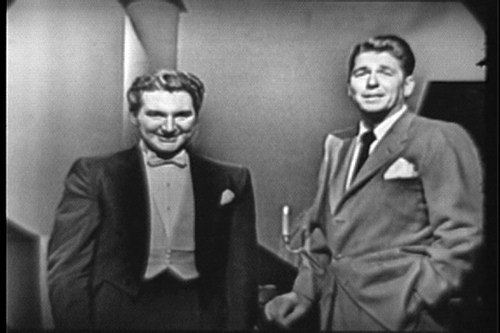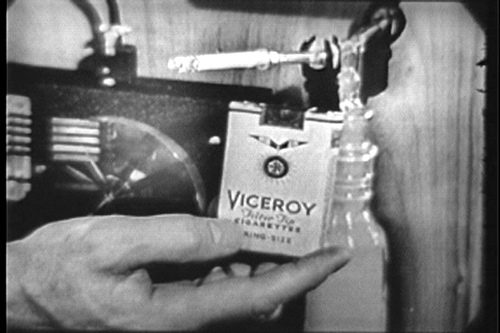
Liberace and Reagan together at long last

The preferred choice for health-conscious smokers
If orphan film ever becomes its own genre, one of its traits will surely be the mixing of the banal with the beautiful, and the ordinary with the outrageous. For the last day session on Friday, the audience got a touch of all four with screenings presented by two Marks: Williams (Dartmouth) and Quigley (UCLA).
Williams went first with a kinescope he became aware of when he was working on his dissertation (soon to be a book) on early television in Los Angeles. Producer Harold Jovien had a private collection of kinescopes, most from shows he worked on, including a special episode of the “The Orchid Awards,” in which Ronald Reagan would give an orchid (for what and why was not clear) to an honored guest. For this episode, irritably sponsored by Viceroy Cigarettes (which promised a less irritable, healthier cigarette) the award went to Liberace, the mid-century’s favorite one-named musician.
With performances by Liberace, stories of family (his mother and his brother) and romance, repeated advertising breaks, and a hokey climax- the passing of a gift orchid from Reagan to Liberace that is perhaps one of the great exchanges in U.S. cultural history (only topped by Elvis Presley's gift of a gun to Richard Nixon), the piece was precisely the kind of televisual gem one expects to see at Orphans. Williams noted that both, ironically, were key icons of the AIDS epidemic in the 1980's.
As the old vaudeville advice goes, never follow an animal or child act. For Orphans, we might add a kinescope of a cigarette company-sponsored award show starring Reagan and Liberace to that list.
But UCLA's Mark Quigley, with help from Dan Einstein, pulled it off during the second half of the presentation. It should be mentioned that they had some help from a six-foot, six-inch bespectacled blond man with a lisp, also known as Bud Keiser. From 1960 to 1983, Keiser was the force behind Insight, a narrative television show sponsored by the Paulists, a Catholic order that seeks to work outside the church to do social good.
In Los Angeles, outside the church meant Hollywood, and Insightrecruited star actors, writers and directors (everyone from Rod Serling to William Shatner to Bob Newhart took part, many of them even donating their fees back to the Paulists) to appear on the show which aired on Sunday mornings and other forlorn time-slots on television stations all over the country. This odd variety of quality television—the show received praise from the New York Times and other places—is offset by the religious, humanist message (as Quigley noted, the show was liberal in its politics except when it came to sex outside marriage and abortion).
Clips of the shows were screened, along with the 1965 episode Locusts Have No King, a small town drama that raises important moral questions about whether one should fight vice, or just leave vice be (Eliot Spitzer, take note). The two also discussed preservation efforts at UCLA's Film and Television Archive, which now houses the collection.
- Martin L. Johnson